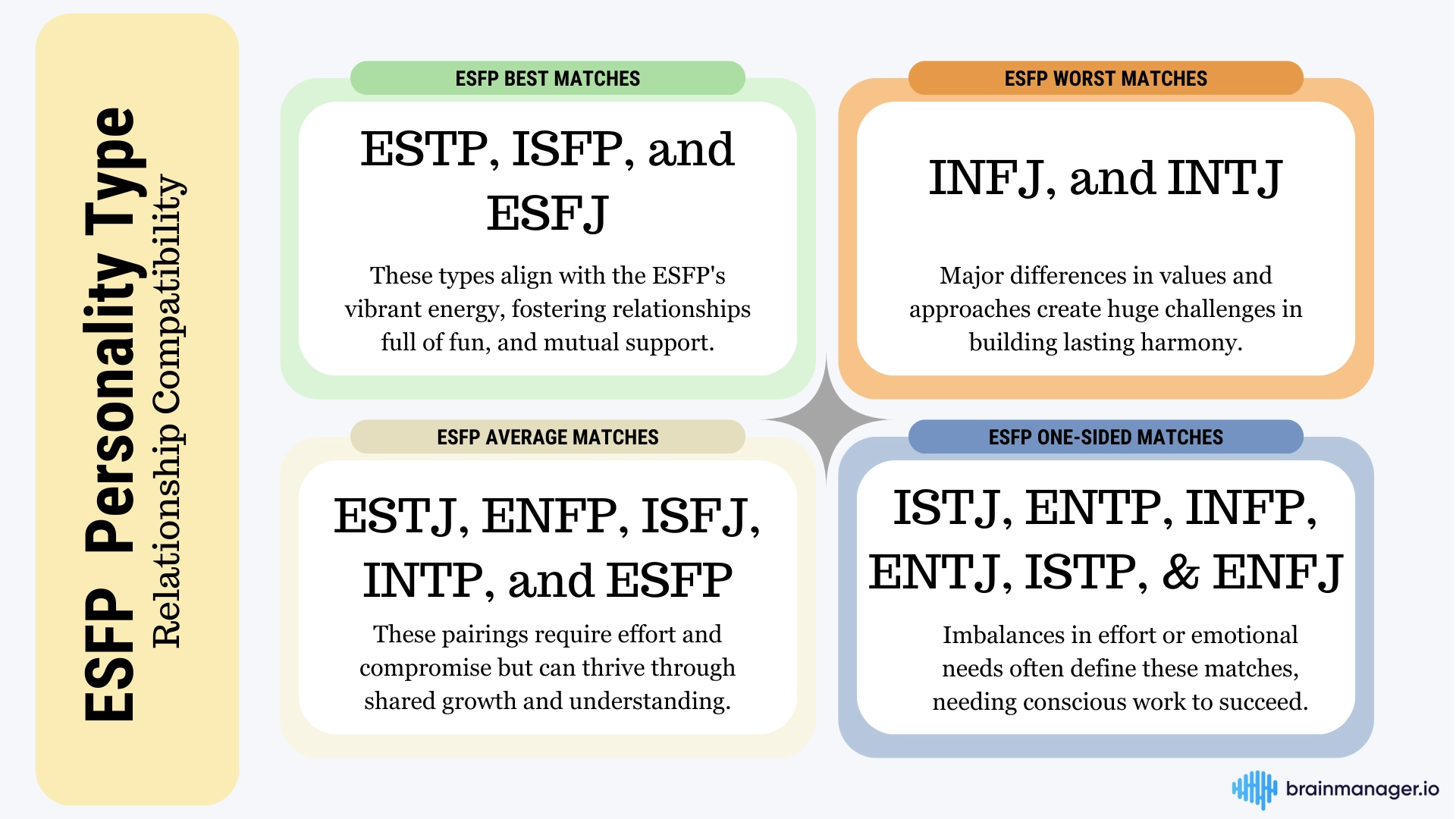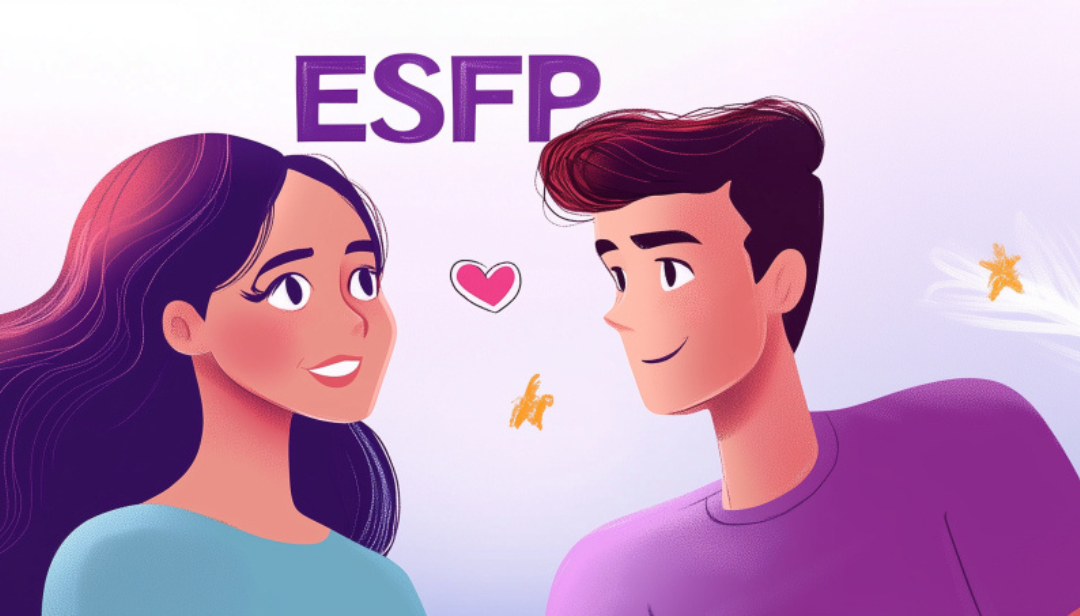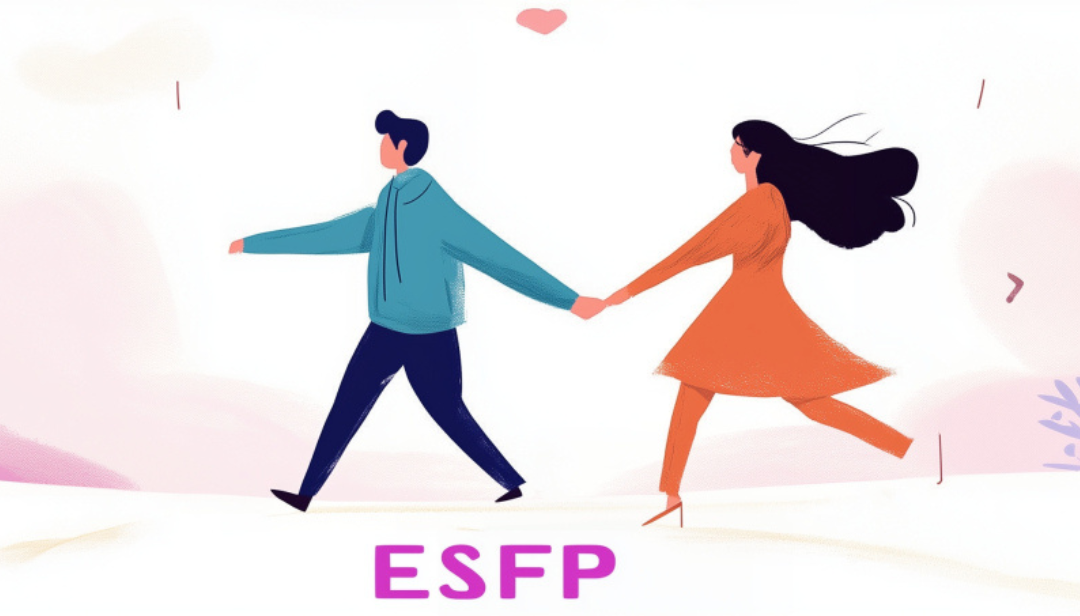Love, Fun, and Emotional Connection: A Comprehensive Look at ESFP Relationships and Their Personality Matches
Curious about how ESFPs, the fun-loving "Performers," navigate relationships? This guide breaks down their best and worst matches, offering insights into their vibrant, spontaneous personalities and how they connect with others. Whether you’re dating an ESFP or are one yourself, discover what makes these relationships thrive.


Back
12 mins read
The Myers & Brigg’s Personality Type Inventory (MBTI) has proven to be a valuable and popular tool for categorizing thinking and behavior patterns. As such, it can help you recognize and navigate relationship compatibility with people you meet and create sounder and more harmonious relationships.
One of the 16 MBTI personalities is ESFP, known as “The Entertainer.” These people bring a unique blend of energy, spontaneity, and warmth to their relationships. With their love for socializing and living in the moment, ESFPs are incredibly fun and engaging partners.
Knowing which personality types complement ESFPs’ vibrant nature can help them find partners who appreciate their spontaneity and zest for life while balancing their need for stability and emotional depth.
ESFPs are best matched with ESTP, ISFP, and ESFJ due to complementary energy levels, emotional values, and shared interests. The worst matches for ESFPs are INTJ and INFJ because ESFPs are typically more spontaneous and emotionally driven. At the same time, INTJs and INFJs are more structured and introspective. These differences can lead to misunderstandings and conflicting priorities.
ESFP Relationship Compatibility Chart

The ESFP compatibility chart below shows who ESFPs are compatible with and how well. This chart visually categorizes the 16 possible pairings, highlighting the best matches, average matches, and those that may require more effort.

If you are an ESFP or dating one, I will help you better understand how their personality traits influence relationships. You will discover the Performers’ motivations, strengths, weaknesses, and how to nurture a thriving relationship.
ESFP Relationship Compatibility
Compatibility is vital in reaching relationship satisfaction and thriving as a couple.
Understanding who ESFPs are most (and least) compatible with can make all the difference in finding and maintaining a fulfilling relationship. Let us dive right in and explore ESFP relationship compatibility and who the best match for ESFP might be.
Best Matches for ESFPs

When deciding who the best match for an ESFP might be (possibly — who should ESFP marry), we considered the factors that allow the partners to connect profoundly and navigate the good times and the bad effectively.
There are six such elements:
- Complementing cognitive functions. ESFPs are guided by extraverted sensing (Se), making introverted sensing (Si), introverted feeling (Fi), or extraverted thinking (Te) cognitively compatible.
- Matching energy sources and needs
- Shared core values and priorities
- Similar communication styles and approaches to conflict resolution
- Support for personal growth
Based on these parameters, ESTP, ISFP, and ESFJ are the most ESFP-compatible personality types.
ESFP Compatibility with ESTP
The relationship between an ESFP and an ESTP is dynamic and fun because of their shared preference for excitement and spontaneity. These partners are engaged in social life and thrive on adventure. The extraverted Sensing (Se) function creates a strong connection through a mutual appreciation for sensory experiences and living in the moment.
Additionally, the ESFP’s feeling (F) and the ESTP’s thinking (T) functions complement each other well. The ESFP brings empathy, emotional insight, and warmth to the relationship, helping to nurture and balance the ESTP’s more pragmatic and logical approach to problem-solving. When together, they navigate both emotional and practical aspects of life together.
ESFP Compatibility with ISFP
The shared Introverted Feeling (Fi) function creates a profound emotional connection between ESFPs and ISFPs. Their cognitive functions match perfectly.
ESFP brings excitement into the mix, while an ISFP stabilizes this energy with their calm presence. These personality types complement each other well, creating a harmonious and supportive relationship that could potentially lead to a long-term (maybe lifelong) connection.
ESFP Compatibility with ESFJ
ESFPs and ESFJs prioritize social harmony and thrive in environments emphasizing warmth and connection.
This match is also characterized by a complementary combination of ESFJs’ strong organizational skills that perfectly balance ESFPs’ spontaneity and zest for life. Together, they create a relationship full of enjoyment and mutual support, with ESFJs providing the structure ESFPs sometimes need.
Average Matches for ESFPs

While some matches are ideal, offering seamless compatibility and mutual understanding, others fall into average matches.
These pairings, though not perfect, are not inherently wrong either. There are no apparent clashes that make harmony unattainable. Average ESFP love compatibility pairings can offer a rewarding relationship. They usually stimulate growth — precisely because you need to learn to navigate and appreciate your differences.
At the same time, such relationships often necessitate more effort and compromise. Still, with the will to put in some effort, you can make these average matches thrive. A proactive approach to relationships was found to predict their success and duration better than the ideal of a soulmate.
Average matches for ESFPs are ESTJ, ENFP, ISFJ, INTP, and other ESFPs, but we will get to the ESFP-ESFP combination later.
ESFP and ESTJ Compatibility
The same aspect that benefits the connection between an ESFP and ESTJ can potentially cause friction in the long run. ESFPs’ spontaneity is balanced with ESTJs’ structure and reliability. Yet, their focus on order and routine can sometimes feel too restraining for ESFPs’ desire for flexibility and spontaneity.
If you want to make this connection work, discuss lifestyle priorities and compromises you are both willing to make right at the beginning of your relationship.
ESFP and ENFP Compatibility
ENFPs and ESFPs thrive on stimulation and adventure, fostering a dynamic and exciting relationship.
However, both ESFPs and ENFPs may struggle with long-term planning and follow-through on commitments. As a result, issues with stability and consistency may arise. The relationship could be too free and wild to last unless you immediately communicate your goals.
ESFP and ISFJ Compatibility
ISFJs offer stability and care, complementing the ESFP’s need for support.
In the beginning, both partners might be mesmerized by their differences. Yet, unless you can overcome occasional friction and make a compromise, ISFJs’ preference for routine and caution could stifle ESFPs’ enthusiasm. On the other hand, ESFPs could feel overwhelmingly bubbly to ISFJs.
ESFP and INTP Compatibility
INTPs engage ESFPs with intellectual stimulation and depth.
Nonetheless, INTPs tend to withdraw and focus on abstract ideas. ESFPs might feel neglected or misunderstood unless they communicate these differences clearly because they prefer more immediate and tangible interactions.
ESFP Worst Matches

Every personality type has the potential for flourishing relationships. However, everyone has met someone with whom they simply cannot find common ground.
Why are some matches just not a good fit for an ESPF?
When our thinking about the world collides with another person’s cognitive makeup, we may find understanding each other’s perspective and decision-making challenging. ESFPs’ preference for information valuable in practice tends to collide with a theory-oriented preference for a bigger picture, such as that seen in types with an inclination to intuition (N).
Moreover, frequent conflicts may be inevitable when one values structure and long-term planning and another is spontaneous, such as an ESFP. When differences in communication styles are added to the mix, frustration usually becomes too grave to bear. ESPFs need expressive and concrete communication, and when that is missing, long-term relationships might not be possible.
These are the worst matches for ESFPs.
ESFP-INFJ Compatibility
The only shared function in the ESFP-INFJ pair is Feeling (F). As such, they both prioritize creating harmony and forming relationships. Still, their differences can make sustaining a harmonious relationship challenging.
INFJs are introspective, idealistic, and intensely focused on long-term goals and meaningful connections. ESFPs thrive on present-moment enjoyment and social activities.
Therefore, these two personality types have contrasting priorities, cognitive patterns, and communication styles. As a result, INFJs likely feel overwhelmed by the ESFP’s need for constant stimulation. At the same time, ESFPs might find INFJs too reserved and unlikely to engage in lighthearted fun.
ESFP-INTJ Compatibility
INTJ is a personality type with a fundamentally different approach to life than an ESFP. The ESFPs and INTJs stand opposing in all functions.
INTJs are highly analytical, future-oriented, and value strategic planning. These traits can conflict with the ESFP’s focus on going with the flow of life. This mismatch can lead to frequent misunderstandings and frustration. INTJs may see ESFPs as overly frivolous, while ESFPs may view INTJs as overly serious and detached.
One-Sided Matches for ESFPs

Unlike bad matches characterized by unresolvable differences, one-sided relationships are those with significant power imbalances. In one-sided matches, one partner invests far more emotion- and effort-wise than the other.
One partner consistently meets the other’s needs and receives little in return. They are supportive but do not receive equivalent support when they need it. The reason is not necessarily a lack of love or selfishness; in one-sided matches, one partner is better equipped to give and the other to receive.
Growth is potential, and these relationships are not unequivocally doomed. However, you should both be ready to invest effort and consciously work on mitigating the existing imbalance.
For ESFPs, relationships with ISTJ, ENTP, INFP, ENTJ, ISTP, and ENFJs are one-sided.
ESFP and ISTJ Compatibility
ESFPs provide spontaneity, fun, and social engagement, bringing excitement and new experiences into the relationship. ISTJ’s need for order might make ESFPs feel like they must constantly adapt to the ISTJ’s need for predictability. If the ISTJ is the giving partner, they might feel overwhelmed by the need to manage the ESFP’s energy.
ESFP and ENTP Compatibility
In the ESFP-ENTP mix, an ESFP provides warmth, energy, and a focus on enjoying the present moment. ENTP’s need for intellectual stimulation might make the ESFP feel unappreciated and undervalued. If the ENTP is the giving partner, they might feel they are constantly providing topics for intellectual discussions and not receiving the same level of cognitive engagement in return.
ESFP and INFP Compatibility
An INFP partner in this combination may feel their need for deep, meaningful connections is unmet. They could perceive ESFP’s excitement and focus on the present as superficial, indicating a lack of interest and commitment. ESFPs, on the other hand, might feel they are constantly trying to lift the INFP’s mood and become tired of it.
ESFPs’ Compatibility with ENTJs
An ESFP may feel pressured by ENTJ’s constant focus on long-term goals and strategic plans. Their contributions to present happiness and emotional expression could seem undervalued by their ENTJ partner. Conversely, an ENTJ could feel like they are the only ones considering the relationship’s future.
ESFP-ISTP Compatibility
In a relationship between ESFP and ISTP, there is a danger of the ESFP feeling neglected or discarded due to the ISTP’s need for independence. If the ISTP partner is on the giving end, they could feel like they constantly need to change themselves and push themselves into being more socially and emotionally engaged than they feel comfortable with.
ESFPs' Compatibility with ENFJs
ESFPs might feel their spontaneous contributions are undervalued by their ENFJ partner. The ENFJ might feel they are the sole organizer and planner in the relationship, feeling like they are doing all the work.
ESFP and ESFP Love Compatibility
Finally, we come to the same personality type pairing. At first glance, it might seem like the perfect match. However, it is, in fact, an average pair. Why?
Even though ESFP-ESFP compatibility often works, the relationship misses the dynamics and differences that would make it more robust and stimulate growth as a couple and individuals.
When two ESFPs come together, they share the same vivacious and spontaneous nature. Their relationship is often exciting because of it. Still, since both tend to avoid long-term planning and focus on immediate gratification, they might struggle with finances or life plans. Also, they might neglect downtime, which is essential for a balanced lifestyle. They need to be mindful of creating space for relaxation and introspection to avoid burnout.
The ESFP-ESFP pair shares their extroverted and feeling nature, but, as a couple, they lack complementary traits that would challenge them to create some stability. As a result, they may face difficulties in managing practical aspects of life.
Similarly, although similarities in perspectives and emotions can create a harmonious environment, an echo chamber effect could stifle the growth potential. An ESFP will reinforce the other ESFP in their viewpoints, and issues might not be subjected to critical analysis and problem-solving.
ESFPs avoid conflict and difficult emotional conversations. Instead, they prefer to keep the atmosphere light and enjoyable. This is why every workplace needs an ESFP — to light the mood up. However, unresolved issues tend to be swept under the rug when two such people meet.
What ESFP Is Like in a Relationship?

ESFPs or Performers, known for their energetic and spontaneous nature, bring a lot of excitement and warmth into their relationships. How does that enthusiastic personality translate into the dating world? What can you expect when dating an ESFP?
ESFPs In the Early Stages of a Relationship
ESFPs’ living-in-the-moment disposition will likely make them an exciting new love interest.
They are the ones who will show up on a date and tell you that you are going on an adventure or a party they have just found out about. Their vibrant energy will make sure your dates are never dull. Prepare for surprise trips and frequent changes in plans because something much more fun has just come up. Also, you will most likely be surrounded by a wide circle of friends, meeting new people, and partying.
ESFPs are typically very affectionate and emotionally expressive. Out of five languages of love, the Performers speak all fluently — and they speak a lot. You might find them showing their love through many touches and caresses, thoughtful gestures and help, gifts and tokens of appreciation, sharing quality time, and giving you tons of verbal affirmations.
ESFPs in a Long-Term Relationship — And Tips to Make It Work
An ESFP is generally supportive and enthusiastic about their partner’s goals and interests. Their caring and social nature will make them a reassuring partner. Ideally, try to provide the same kind of support. In that case, you will thrive as a couple, sharing experiences and empowering each other.
The Performers might focus more on enjoying the present than planning for the future. This is an exciting trait, great for keeping the relationship lively. ESFPs make sure things never get too routine or boring. However, it could frustrate their partners, especially if they are the planning and organizing types. If you find a balance and are all right with taking on a bit more organizing, you could be long-term compatible with an ESFP.
ESFPs have a lot to give if you know how to receive. Do you want to know tips for a successful relationship with an ESFP?
- Embrace spontaneity. Be open to spontaneous activities, go with the flow, and try new things. See the relationship as an opportunity to expand your horizons and comfort zone with a loving guide.
- Communicate clearly. Since ESFPs might avoid conflict, honest and sensitive communication about how you experience issues is crucial. Encourage open communication to handle conflicts constructively because, according to research, a tailored communication approach can make or break your chances of resolution.
- Appreciate their warmth. Recognize and reciprocate ESFPs’ affectionate nature because the more you reinforce them and the more emotion you give, the more they will give back.
Strengths of an ESFP in a Relationship
For the compatible partner, ESFPs bring many benefits to a relationship:
- They are very warm-hearted and genuinely care about their partners.
- When endowed with a secure attachment style, they make their love obvious and are no strangers to public displays of affection.
- They tend to have a positive, optimistic outlook on life, which can be uplifting for their partners.
- ESFPs are great at creating memorable moments and fun activities for their partners.
Weaknesses of an ESFP in a Relationship
As with anyone, ESFPs also have some potential weaknesses in relationships. These tend to come forth not only when they date a personality type that is not compatible with ESFP but also when they have an insecure attachment style, particularly an avoidant one. These are the most common weaknesses of an ESFP in a relationship:
- Dislike for routine and predictability. Even though exciting, this trait can sometimes cause trouble maintaining long-term commitments or dealing with mundane responsibilities. This does not mean they do not handle marriage or commitment well as a rule, but mutual understanding and respect for differences are necessary for long-term relationships.
- Spontaneity. It can sometimes transform into impulsiveness and decisions that are not well thought out.
- Avoiding conflicts. Not dealing with problems head-on might temporarily make things less tense. Still, this tendency leads to unresolved issues and resentment.
Therefore, the key challenges ESFPs tend to face in a relationship are twofold. The first is the prospect of becoming easily bored. The second is in communication and avoiding dealing with difficult situations (which arise in any relationship).
What an ESFP Is Looking for in a Relationship

ESFPs’ relationship needs and preferences are shaped by their extroverted, sensing, feeling, and perceiving traits.
They seek partners who can keep up with their enthusiasm and openness to experiences. Moreover, they often look for someone who enjoys socializing and is comfortable in social settings. An ideal partner for a Performer will be expressive with their feelings and appreciative of ESFPs’ affectionate nature. Such individuals can meet their relationship needs.
Relationship Needs
What do ESFPs need in a relationship?
The primary element of a satisfactory relationship for Performers is emotional support. They expect encouragement, understanding, and emotional support. They give a lot and expect the same in return for feeling loved.
Flexibility in a relationship is vital as ESFPs dislike rigid schedules and strict routines. Their partner should know how to adapt to changes and not be troubled by a lack of structure in their schedule.
Finally, an ESFP-compatible person will meet their need for encouragement. The perfect relationship for EAFPs is one where partners stimulate growth in the other. A Performer needs their partner to celebrate their achievements, push them to pursue their dreams, and realize their talents.
Relationship Turn-Offs
On the other side, ESPFs have several definite turn-offs in a relationship.
- Overly critical partners, or those cheap on praise, will turn an ESFP off.
- Pessimistic people are not compatible with ESFPs.
- Disengaged, low-energy individuals do not match well with an ESFP.
- A partner who is challenging to engage and get interested in something is a turn-off for an ESFP.
- Feeling constrained or controlled is a definite no-no for free-spirited ESFPs.
Navigating Relationships as (or with) an ESFP: Embracing Excitement and Emotional Connection

As an ESFP, embracing your vibrant, spontaneous nature while seeking emotional connection is vital to thriving relationships. You have much to give and are eager to share your zest for life with the perfect match.
Understanding your strengths and needs and recognizing potential challenges allows you to foster fulfilling partnerships. When you find someone worth your company, focus on clear communication to make the relationship work and enjoy blissful times together. BrainManager’s series on developing your communication skills could help with that.
For those dating or wanting to date an ESFP, prepare for a relationship full of excitement, warmth, and genuine affection. Appreciate their spontaneity and provide the stability they may sometimes need. Being open to new experiences and maintaining a positive, supportive attitude will help you build a strong bond with your ESFP partner.
Ultimately, ESFPs’ ability to create memorable moments and genuine warmth make them dynamic and loving partners, capable of forming deep, lasting connections!


Return to Blog




